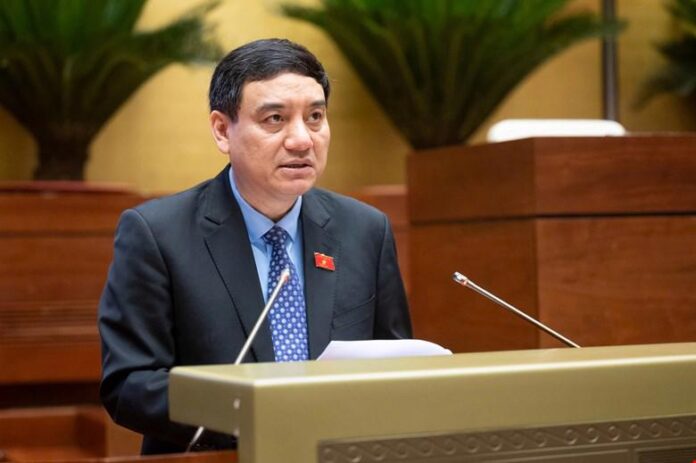Presenting the report on the Law Draft Amendment on Advertising, Chairman of the Culture and Society Committee Nguyen Dac Vinh stated that some opinions deemed the term “advertisement carrier” vague and inclusive, not covering online advertising activities. They suggested clarifying the forms of wearing, hanging, attaching, pasting, drawing, or similar.
There were suggestions to amend the term “advertisement carrier” to “organization or individual carrying advertisements.” Others proposed removing the definition of an advertisement carrier and, instead, defining online social network advertisers.
INCREASING RESPONSIBILITY FOR ADVERTISERS
Regarding this matter, the draft law supplements regulations for “advertisement carriers” to address practical issues. Many entities exploit influential individuals to advertise untruthfully, especially on social media, causing consumer harm. The law also governs those using direct advertising methods.
To refine this term, the draft law integrates feedback, clarifying “advertisement carriers” to encompass practice and align with explanations of “advertiser,” “advertising service provider,” and “advertising issuer.” It distinguishes two types of entities.
First, those directly advertising, recommending, or confirming products, goods, or services online.
Second, those directly advertising through wearing, hanging, drawing, purposeful usage, or other forms as per governmental regulations.
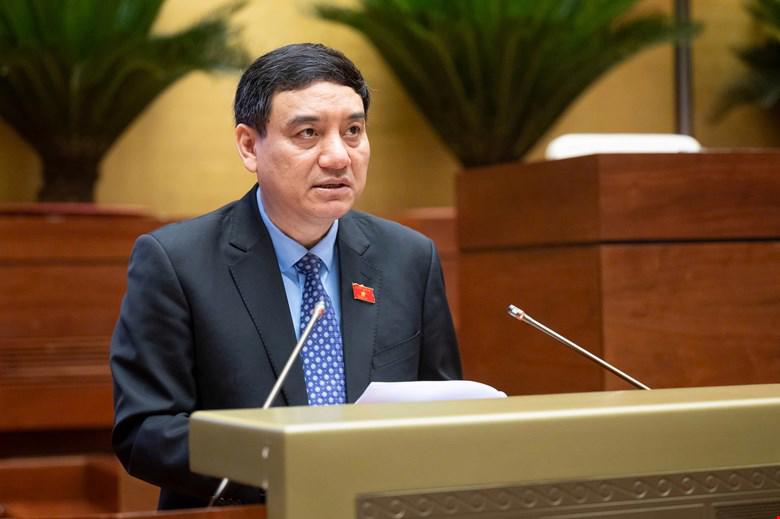
For direct online advertisers, the concept is refined to include not just “advertising” but also “recommending” and “confirming.” This prevents carriers from denying advertising intent, claiming to provide simple product information or personal experiences, thus evading legal consequences and complicating inspections and handling of violations by state management agencies.
Regarding the rights and obligations of advertisement carriers (Article 15a, Clause 8, Article 1 of the draft law), some opinions suggested that Article 15a primarily outlines duties, neglecting the rights of advertisement carriers.
Some recommended a review for consistency between the draft law and the Law on Consumer Rights Protection of 2023. They suggested specific distinctions for each role in advertising, with corresponding rights and obligations proportional to their involvement.
On this matter, Chairman Vinh acknowledged the validity of the feedback. To ensure feasibility and address current realities, where many online users, including influencers, introduce and promote substandard or misleading products, the draft law has been scrutinized and aligned with the rights and duties of advertisers, advertising promoters, issuers, and service providers. Article 15 now comprises three clauses.
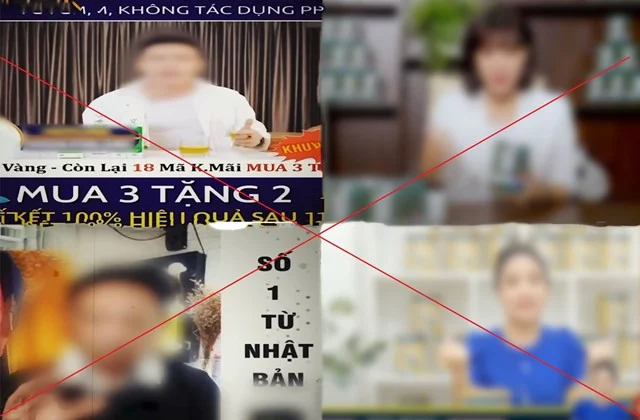
Clause 1 defines the rights of advertisement carriers. Clause 2 outlines the obligations of advertisement carriers in general, covering all entities defined in Clause 8, Article 2. Clause 3 specifies the obligations of advertisement carriers who are influencers.
Some suggested general provisions for advertisement carriers, avoiding separate regulations for influencers. They recommended stringent penalties for influencers or authorizing the government to impose harsh punishments. They also proposed supplementary sanctions, such as banning advertising, business operations, or social media participation and mandating public apologies.
Mr. Vinh asserted that distinct provisions for influencers emphasize their social responsibility when carrying advertisements. This addresses the current situation, where many influencers promote substandard or misleading products, causing consumer dissatisfaction.
Regarding sanctions for influencers, he suggested that the government refine administrative penalty regulations and other provisions per the delegates’ feedback.
REVIEWING MORAL AND PROFESSIONAL RESPONSIBILITIES OF INFLUENCERS
During the hall discussion, delegates highly agreed on tightening the responsibilities of KOLs and celebrities in advertising. This Law Amendment is expected to fill legal gaps and establish a clear and robust legal framework adaptable to the dynamic nature of modern advertising.
Delegate Huynh Thi Phuc from Ba Ria-Vung Tau clarified that advertising, especially on digital platforms involving KOLs, has drawn societal attention. KOLs are individuals or entities with expertise and significant influence in their fields or society.
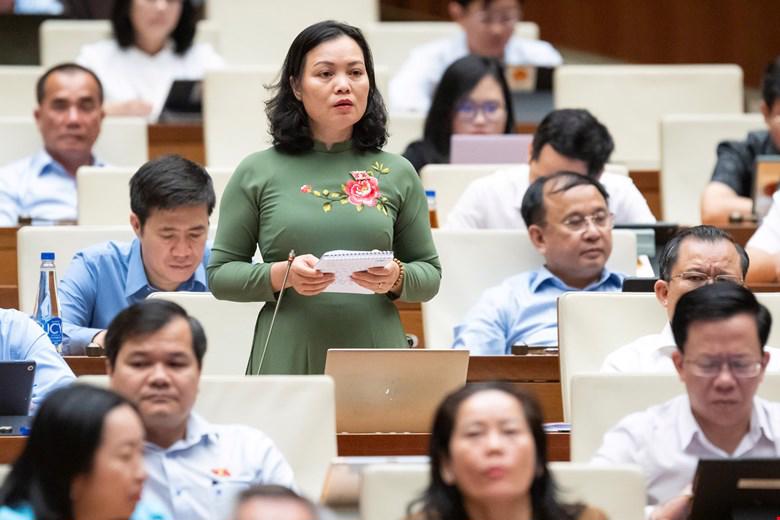
They are key opinion leaders who inspire and guide public opinion, influencing others’ decisions. Examples include celebrities, social media content creators with diverse audiences, like YouTubers, Facebookers, or TikTokers, or key consumers with substantial market influence. They share authentic experiences and provide subjective evaluations, earning customer trust, especially in marketing and brand advertising campaigns.
These issues have been highlighted at least twice during the 15th National Assembly’s question-and-answer sessions. Therefore, this law emphasizes the responsibilities of organizations and individuals in advertising services, issuance, and influence, necessitating stricter administrative penalties in advertising due to their direct impact on people’s lives and health.
The delegate also urged expediting amendments to the Decree on Administrative Sanctions in advertising, enhancing penalties to deter violations and protect consumers’ health, lives, assets, and interests. She recommended scrutinizing and supplementing regulations on the morals and professional responsibilities of these entities, especially influencers.
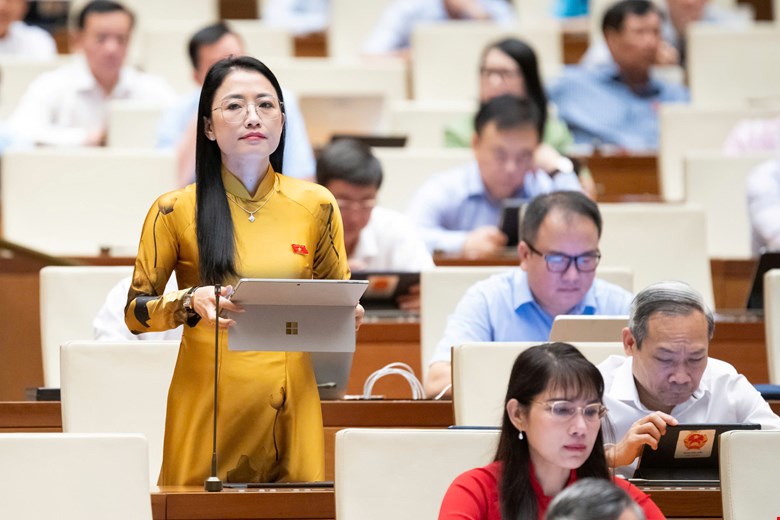
Some opinions advocated for a stringent management mechanism for celebrities and influencers. When these individuals, working for agencies or organizations, violate advertising regulations, especially by advertising falsely, their entities should have a strict internal management system. They suggested amending and supplementing internal activity regulations to define professional ethics in advertising and outline violation consequences.
Delegate Tran Khanh Thu from Thai Binh proposed that the drafting committee consider supplementing regulations on controlling and managing advertising activities on all online television platforms, news sites, and electronic information pages. She urged stringent measures against pages publishing false or misleading advertisements or featuring celebrities advertising inaccurately, causing consumer harm. Additionally, she recommended mandating pages to assume responsibility for advertisement vetting before publication, moving away from relying solely on automatic advertising systems.
Citing recent cases of fake milk and functional food products with forged inspection and testing documents, she questioned the feasibility of requiring advertisers, especially singers, artists, and actors, to verify product-related documents.
“Scandals of Fake Milk and Supplements: Celebrity Endorsements under the Spotlight”
“Is it feasible to expect advertisers, especially singers, artists, actors, and KOLs, to take responsibility for verifying product-related information?,” questioned Tran Khanh Thu.
The New Threshold for Procurement Contracts: Raising the Bar to 300 Million
On November 29, with an overwhelming majority of 444 out of 446 National Assembly delegates voting in favor (accounting for 92.69% of the total number of National Assembly deputies), the National Assembly passed the Law amending and supplementing a number of articles of the Law on Planning, Investment Law, Law on Investment in the form of Public-Private Partnership, and the Bidding Law.



















![[IR AWARDS] June 2025 Disclosure Calendar: Mark Your Dates](https://xe.today/wp-content/uploads/2025/06/HinhT6_01-218x150.png)






